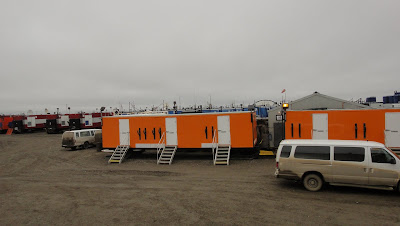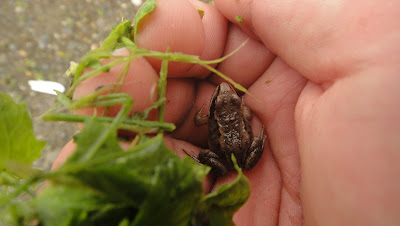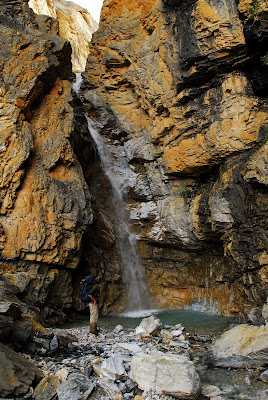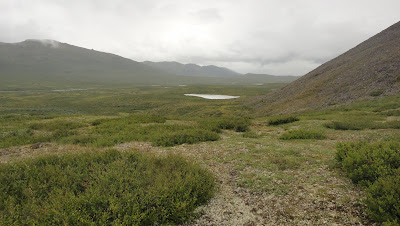

The Sag sags. It's a gentle gurgle, a patient dribble, a sleepy two-lane road through a school zone. It leaks like blood from a wound. Unlike other wild Alaskan rivers, it neither screams nor fumes, but flattens and snakes. It suppurates. That's because the Sagavanirktok River (or "Sag")--which stretches 180 miles from the North Slope of the Brooks Range to the Beaufort Sea of the Arctic Ocean--moves mostly over flatland.
The other day, I got a couple days off from my dishwashing shift, so my friend Sarah from Coldfoot came up to Deadhorse and we went on a two and a half day trip on a sizable section of the Sag.
We took Alpacka Packrafts with us--expensive, ingenious inventions that typically weigh less than five pounds (plus a couple more when you add the weight of the oar). The rafts can be deflated and easily carried, permitting hikers to cross otherwise uncrossable lakes and rivers (and navigate along really shallow rivers like the Sag in ways that canoes, kayaks, and rafts can't).
Sarah, walking over tundra plain with raft in her pack.

Here I am in my dry suit, which kept my skin and underclothes dry (even if I had submerged my whole body underwater). The suit also functions as a windbreaker and rain gear. If it was hot (which it wasn't) I would have been perspiring nastily inside. (I'm not sure why I look so distraught in this picture since I'd just enjoyed a cookie break.)

The rafts are crafted in such a way that they can hold all your gear at the foot of the raft. My lower half is underneath a protective sleeve that prevents the ingress of water. On my backpack, I have my bear spray handy in case of a charge, though the grizzly bears are few and far between this far north, and the polar bears rarely venture this far south.


The North Slope, the arctic coastal plain, the Sag... It all feels just so alien, so unearthly, so unwordly. Give the sky an apocalyptic tint and it would be easy to believe we were on a different planet.
It's just so bafflingly flat. And it feels even more so when on the river because we rarely could see over the edge of the bank. And because there are no skyscrapers, no mountains, and no trees, we no longer have a landscape, only a skyscape. And the sky never seemed so huge. I felt like a tiny organism in a pool of water under the microscope of the sky--a lens so large you can't help but feel how proportionally tiny you are.
These unfamiliar skies are filled with the hieroglyphics of winds and storm and cloud--whose origins and intentions are unknown to my untutored eye. At any time of the day, I could point out dozens of distinct species of cloud--all coexisting peacefully, indifferent to one another, like animals of the Serengeti around a watering hole. Curling around the horizon is a foggy haze; off to the northwest there are bubbling microwaved marshmallows; to their northern flank is a hauntingly-flat alien starship; and above us directly is wispy Chinese calligraphy whose figures bend and stretch with the stratospheric gales.
"Where the hell are we?" Sarah asked.
I didn't know. Maybe it's just that I'm so new to this landscape, this skyscape, but I felt like I could never know this place; that I'd never feel at home or at ease here. Romantic bullshit aside, the north slope can be a downright dreary place. But maybe that's just because my eye is trained to look yonder at wide, sweeping changes in the land, at places with an ever-startling array of features, like the Appalachian Hills or the Brooks Range. Maybe it's just that I don't know how to properly see and feel a place like this.
While I don't think I could be content to live in such a landscape, I do very much appreciate its bizarre nature, and the bizarre feelings it causes to bubble up to the surface.

Franklin Bluffs, one of the few points on our trip where the land rose.

Musk ox! First time I've ever taken a picture of one. This was taken on our drive down the Dalton Highway en route to our starting point on the Sag. It was all by itself. It watched me for a couple minutes as I snapped photos of it from the road.

Sometimes the Sag can feel almost Bahama-like. The blue skies, the still, glassy water, the salty gales, a half dozen gulls sounding alarms, floating on the breezy drafts. The sun pokes out around the edge of a cloud and casts a bright light on a stand of squat lime green willow trees. While I was cold and bundled underneath layers of clothing, I couldn't shake the feeling that such a cold, dreary place can feel oddly tropical.

Lots of birds up here on the coastal plain. In the picture below, on the ground is a raven; above, a flock of geese headed south.































































